 Do you need to raise funds to get your idea off the ground?
Do you need to raise funds to get your idea off the ground?
You've got a brilliant business idea, but your bank lacks your vision. (Or perhaps you lack the collateral.)
Maybe you reached out to friends and family, but you know they lost their shirts when your brother-in-law's salmon-flavored energy drink flopped. Is this the death of your nascent business?
Not. So. Fast.
Social media is changing more than the way we market and communicate… It's changing the way we raise capital.
Crowdfunding websites are popping up that connect entrepreneurs with investors, producers with patrons, and causes with contributors.
What is crowdfunding?
Crowdfunding builds upon the idea of crowdsourcing: “the act of outsourcing tasks, traditionally performed by an employee or contractor, to an undefined, large group of people or community (a “crowd”), through an open call.” (Wikipedia)
Crowdfunding pulls together a community—tightly knit or disparate—to fund a project, business or cause, usually via the Internet.
How does it work?
Although the rules differ from site to site, generally people (or businesses or charities) pitch an idea, set a fundraising goal and set a deadline for raising funds.
Potential patrons can review the pitches and decide if there are any they'd like to support. On most crowdfunding sites, people are not investing in the project or business; rather, they are funding it. They are rewarded if the project comes to fruition, but don't end up owning any part of the business or project.
This is in part due to U.S. regulations currently under review by the SEC, so this may change in the near future. However, different sites have different rules, especially those based outside the U.S., so make sure you review the terms and conditions carefully!
To launch your own project, I'll focus on Kickstarter—one of the most popular crowdfunding sites—as an example.
You start with a pitch: you describe your project, specify what rewards patrons will receive if the fundraising is successful and create a funding goal and a timeline.
If you don't reach your funding goal by the deadline, no money changes hands. As Kickstarter says, this “protects everyone involved. Creators aren't expected to develop their project without necessary funds, and it allows anyone to test concepts without risk.”
Get World-Class Marketing Training — All Year Long!
Are you facing doubt, uncertainty, or overwhelm? The Social Media Marketing Society can help.
Each month, you’ll receive training from trusted marketing experts, covering everything from AI to organic social marketing. When you join, you’ll also get immediate access to:
- A library of 100+ marketing trainings
- A community of like-minded marketers
- Monthly online community meetups
- Relevant news and trends updates
Pledges are made with a credit card; if you're backing a project, your card won't be charged until the project is successfully funded.
How do you get your projects noticed… and funded? A quick look at the active projects on Kickstarter or IndieGoGo will show that you've a lot of creative competition out there.
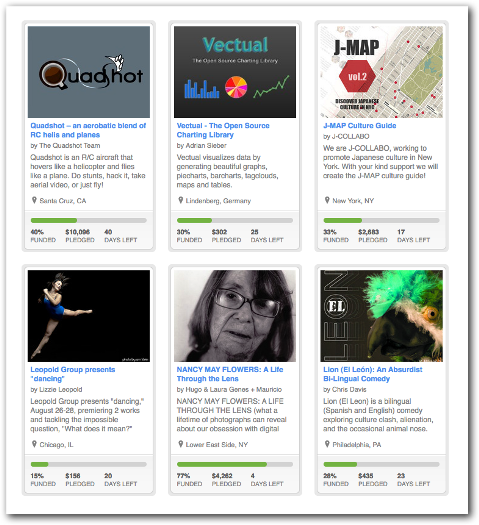
To catch the eye of potential funders, you're going to need to stand out, engage your community and close the sale.
Here are 11 tips to help you secure funding:
#1: Choose the right crowdfunding site
Although there's plenty of overlap in many of the crowdfunding sites out there, each caters to a specific audience.
Are you a creative? Be sure to check out Kickstarter or IndieGoGo.
Looking to start more of a traditional, albeit entrepreneurial, business? Head over to ProFounder.
Does your idea have a social bent? You might do well at Buzzbnk or 33needs.
Non-profits can fundraise at sites like CauseVox or FirstGiving.
In the no-niche-too-small category is AppBackr that focuses exclusively on mobile app businesses.
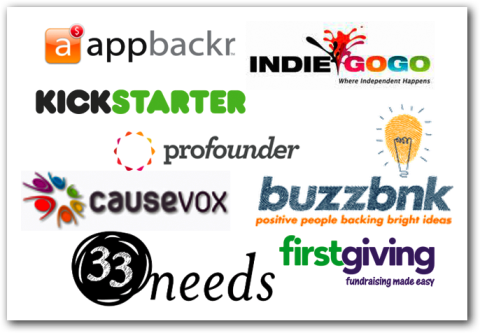
#2: Know your target audience(s)
Anthony Kaufman recommends identifying your target audiences, like Jennifer Fox did while raising money for her film, My Reincarnation.
Fox had two built-in niche audiences to target: fans and followers of her primary subject Tibetan Buddhist Master Chögyal Namkhai Norbu, of which there are many worldwide, and the estimated 7,000 people that Fox cultivated during the grassroots release of her last film, 2006's “Flying: Confessions of a Free Woman.”
Focusing on a passionate niche can help, too. Many of the successful projects on crowdfunding sites target a specific, narrow audience. The target audience might be focused in a geographic area, religious in nature or share a common background. Graphic novels and music tend to do well, too.
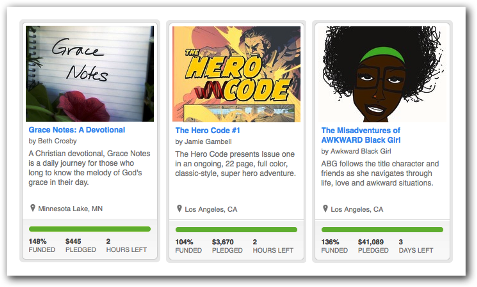
#3: Plan ahead
According to John T. Unger, an artist and designer who has successfully funded a project on Kickstarter:
The best advice I have is to plan ahead. A Kickstarter project can go by really quickly.
The vast bulk of backers seem to happen at the very beginning and very end of a project, according to Kickstarter's own data. That makes sense… it's exciting when it's new and it's exciting when it's down to the wire.
In the future, I'll be sure that I have emails written specifically for the beginning, middle and end of a project so that I can keep it active. When a project does take off it can be kind of overwhelming to respond to everyone quickly enough, so FAQ-type emails that are pre-written help a lot too.

Discover Proven Marketing Strategies and Tips
Want to go even deeper with your marketing? Check out the Social Media Marketing Podcast! Publishing weekly since 2012, the Social Media Marketing Podcast helps you navigate the constantly changing marketing jungle, with expert interviews from marketing pros.
But don’t let the name fool you. This show is about a lot more than just social media marketing. With over 600 episodes and millions of downloads each year, this show has been a trusted source for marketers for well over a decade.
Craig Mod, who successfully raised $24,000 on Kickstarter reiterates this idea of the reverse bell curve of patron interest in his excellent article Kickstartup – Successful Fundraising with Kickstarter.com & the (re)making of Art Space Tokyo.
“People engage things: a) when they're brand-new, or b) when they're nearing a deadline. We lose interest in that middle space.”

#4: Passionately pitch your project.
You've heard the old saying, “you only get one chance to make a first impression.” Well, it's even tougher on popular crowdfunding sites where there are 30 other projects simultaneously trying to make a first impression on the same page.
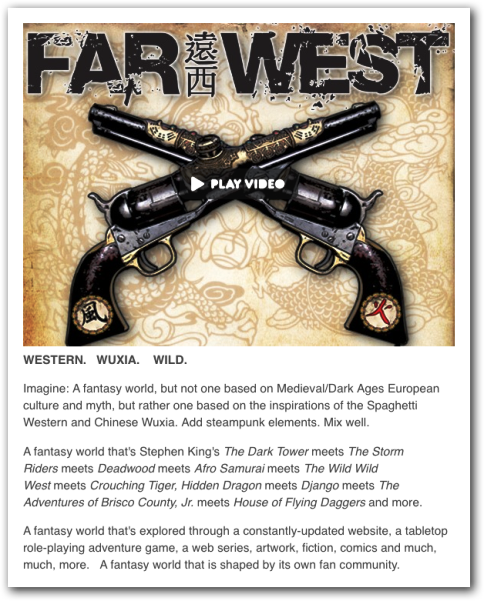
Create a compelling name, description and an image as part of your project to help you stand out. A video is critical, too. (See #10 for more on that.)
#5: Have a plan for spending their money.
No matter how cool your idea is, most people want to know that you've got a plan that will get you there. Ricebowlproject suggests that you “give a detailed explanation of how exactly you'll be using their money and keep all costs transparent. This will build trust in you and credibility in your project.”
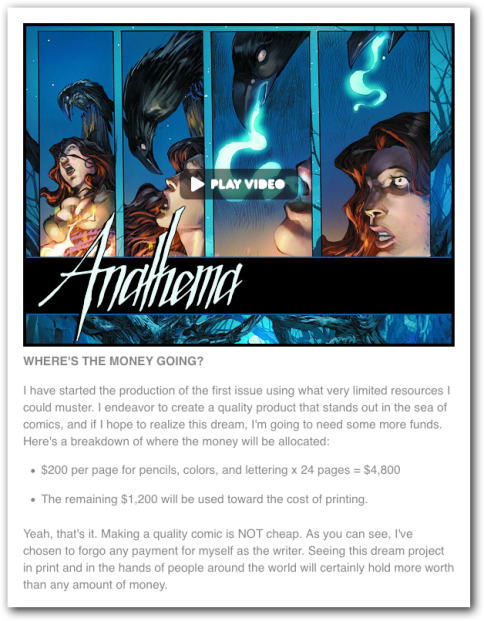
#6: Leverage your social networks.
It's important to realize that most of your audience may not be familiar with crowdfunding. Chances are you'll need to use social media, email marketing and other communication tools to drive your community to your project at a crowdfunding site.
Unger says:
[Crowdfunding sites aren't] “much different from any other launch in a lot of ways—so to get attention, I used the same tools as usual: email to the list, Twitter, Facebook, etc.”
Yet again, the importance of list-building and networking can't be overstated.
Do you need help leveraging your social networks? Social Media Examiner is filled with hundreds of helpful posts, including:
- 13 Hot Facebook Marketing Tips From the Top Pros
- 9 Ways to Use Social Media to Launch a Book
- 5 Ways to Use Twitter to Connect With Local Customers
#7: Break up bigger projects
None of your potential patrons are likely to drop $100,000 on your next big thing. If they were that flush, they'd probably be investing with Bernie Madoff. (Hmmm… Maybe they were.)
Your project has a better chance of reaching its funding goal if you break the project into smaller, bite-sized pieces. You might break your video into filming, editing and distribution. Rather than trying to raise enough to start a business and make payroll for two years, start by raising enough to build a prototype of that solar-powered toothbrush you've been dreaming about.
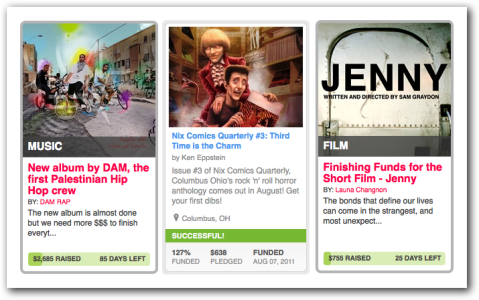
People like to feel like their contribution is going to make a difference. Fifty dollars makes a bigger splash when you're raising $1,000 than when you're raising $10,000.
Smaller requests seem more attainable, and people want to feel like they're on a “winning team.”
#8: Create compelling rewards
Kris White offered plenty of rewards for patrons of his graphic novel The 36. Some were fairly standard, including a PDF copy of chapter 1 for pledges of $1. However, four patrons who were willing to pledge $1,000 each could get their name and likeness “immortalized” as a supporting character in the story.
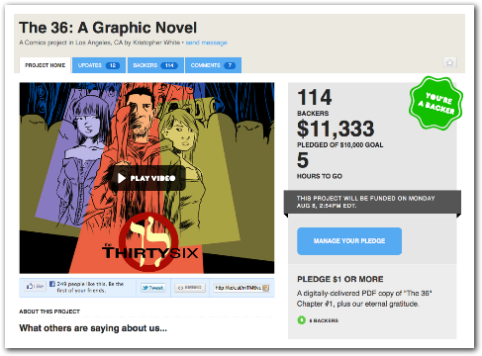
#9: Treat your crowdfunding like a campaign
Pitching a project is the beginning, not the end, of your work. You need to continually drive people to your project page. Many crowdfunding sites use traffic and early success as indicators of which projects to feature. IndieGoGo states that 50% of deciding who gets featured comes down to “pageviews, number of funders, % of goal completed.”
#10: Tell a great story… and ask for the sale
As Jeanie Finlay says in her post, Adventures in Crowd Funding, “when I launched the first campaign, I simply put up the trailer and we raised about 10 pence… I made a new trailer with me pitching the film… it made a world of difference. I now believe that people invest in the filmmakers as much as the project.”
#11: Promise—and give—credit where credit is due
People love to be acknowledged. Whether it's on the liner notes, film credits or etched into the wall in your retail space. Let people know how they'll be credited and follow through. It gives you a great story to tell and builds your base for your next crowdfunded adventure.
Takeaways Tips on Crowdfunding
Successful campaigns require passion, a clear vision and a strategic plan that can be executed. You'll get the most activity at the beginning and end of your campaigns, but you need to be working for your goals throughout.
Have you financed a project through crowdfunding, or are you planning to do so in the near future? If so, please share the details (and links) below. If you have your own tips and tricks not mentioned above, we'd love to hear about those, too. Leave your questions and comments in the box below.
Attention Agency Owners, Brand Marketers, and Consultants

Introducing the Marketing Agency Show–our newest podcast designed to explore the struggles of agency marketers.
Join show host and agency owner, Brooke Sellas, as she interviews agency marketers and digs deep into their biggest challenges. Explore topics like navigating rough economic times, leveraging AI, service diversification, client acquisition, and much more.
Just pull up your favorite podcast app, search for Marketing Agency Show and start listening. Or click the button below for more information.

